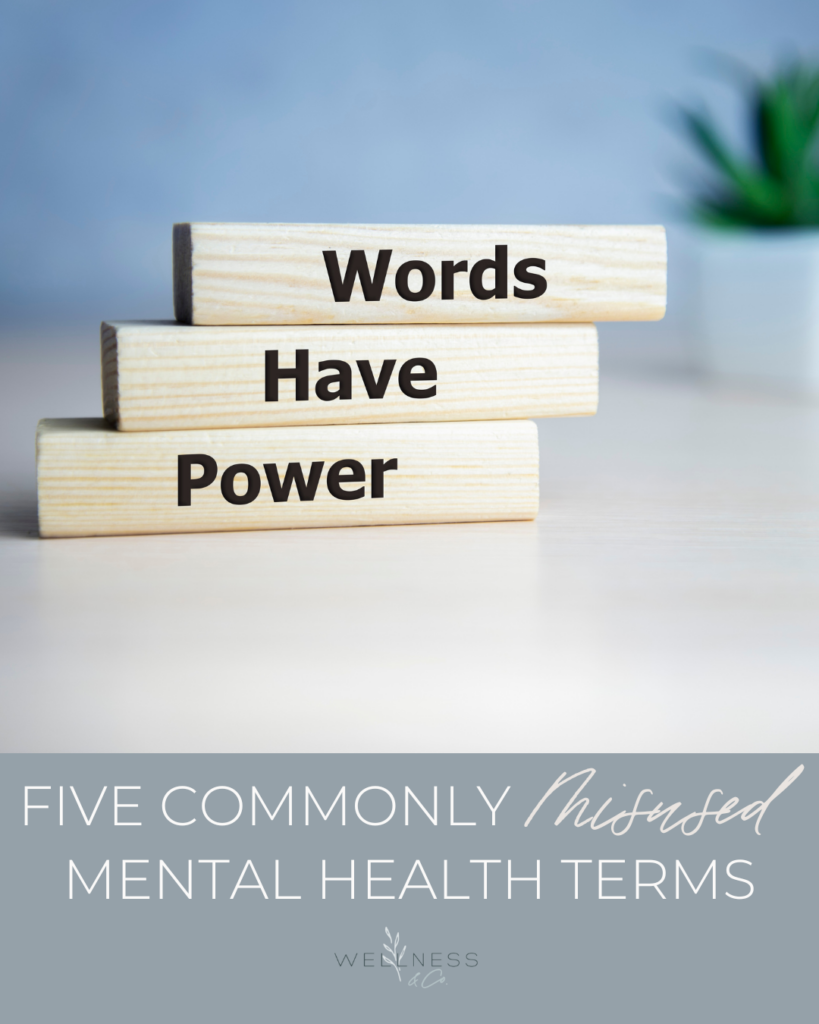Follow
Wellness & Co.
Hi, I'm Dr. K, Wellness & Co. is a growing therapy/coaching practice and educational hub for prospective clients based in Maryland and virtual clients all over the world!
Hi, I'm Dr. K
free guide
e -books
e -course
“Um, Actually”: 5 Commonly Misused Mental Health Terms
December 31, 2024
By Kyle Turner, LGPC
READING TIME: 5 MINUTES

There’s no denying it: mental health is fascinating. Since the pandemic, more people than ever are delving into their own psyches and bringing the discussion of mental health out of the shadows and into the light. Buttt, we seem to be a little unclear on some of the terminology. Don’t worry, I’m here to help (and be extremely pedantic about my favorite pet peeves along the way)!
Here are 5 of the most commonly misused mental health terms I’ve encountered in my work as a counselor:

1. “Trauma Bond”
The definition of a true trauma bond is the result of repeated cycles of abuse, manipulation, and emotional dependency (Carnes, Lee, & Ball, 2015). Trauma bonds are relationships between an abuser and a victim, not between two people who’ve had a tough experience (Le, 2020).
These days, the word gets tossed around often. Did your sister forget your birthday and make passive-aggressive comments? Trauma bond! Ex-boyfriend rear-ended someone while borrowing your car? Trauma bond! You and your bestie survived a tough psychology class? Trauma bond! While my friends and I are certainly closer for having survived the 7-hour extended edition of Lord of the Rings, it doesn’t mean we’re trauma-bonded. It just means we sat through a long, somewhat boring movie.
2. “Gaslighting”
“Gaslighting” is the latest buzzword in toxic relationships. But much like “narcissist,” it’s become a catch-all for nearly any type of negative behavior in a relationship.
True gaslighting involves a persistent, calculated pattern of manipulation where someone systematically makes you question your reality, memories, and perceptions (Sarkis, 2018). It’s not just a partner occasionally denying they left the toilet seat up (which, let’s face it, they probably did).
If you suspect your partner is gaslighting you, look for the following signs:
· Persistent patterns of denial/deception even when you know your partner is lying
· Being frequently undermined and humiliated by your partner
· Feeling isolated from friends/family/emotional supports due to partner’s behavior
· Trivializing/minimizing your feelings: “You always overreact”, “Why are you so emotional”, etc.
3. “Triggering”
We all have certain stimuli that evoke strong reactions. The sound of a car backfiring, the smell of your ex’s cologne, or even seeing ketchup on steak—these can be upsetting or uncomfortable.
But being “triggered” isn’t just feeling mildly distressed. Clinical triggers are specific stimuli that cause intense psychological distress, such as panic attacks or flashbacks, especially in people with PTSD or trauma-related disorders (Friedman & Schnurr, 2016). A true clinical trigger isn’t a minor setback; it’s the precursor to extreme psychological distress.
So unless the situation predicates full-blown physiological distress, you’re likely experiencing a mild irritation rather than a true trigger. I get pretty cranky every time I walk into a retail space and hear Mariah Carey’s “All I Want for Christmas is You” despite the fact that it’s the holiday season, but calling it a “trigger” would be doing a disservice to my clients with real traumatic triggers.
4. “Trauma”
“Trauma” is another term that’s been watered down over time, and I usually see it in the same context: “That movie traumatized me”, “That character dying at the end of the novel was so traumatic”, “That Minecraft session was like a trip to Trauma Town”, etc.
In the clinical context, trauma refers to events or circumstances that are physically or emotionally harmful, life-threatening, and have lasting negative effects on well-being (NIMH, 2021). This last criterion is particularly important, and one of the main things we look for as clinicians. This can include things like abuse, assault, death/loss, or natural disasters.
It might be a tough pill to swallow, but strong emotional reactions to media very rarely qualify as traumatic. I get it, we all got wrecked by the first 5 minutes of Pixar’s Up, but unless the phrase “adventure is out there” sends you into an immediate fight-or-flight response, you probably weren’t traumatized by the movie.
5. “OCD”
People often say they’re “so OCD” just because they like their desks organized or can’t stand clutter, but this description really downplays what Obsessive-Compulsive Disorder (OCD) actually is. OCD is a mental health condition in which someone experiences intense, unwanted thoughts (obsessions) and feels compelled to perform certain actions (compulsions) to reduce their anxiety (American Psychiatric Association, 2013). These behaviors go far beyond simple preferences—they’re often time-consuming, distressing, and can seriously interfere with daily life.
When we use “OCD” to describe a habit of liking things neat, it trivializes the struggles people with real OCD face and spreads a lot of misunderstanding. This casual misuse of “OCD” can make it harder for those who actually have the disorder to be recognized and taken seriously (Abramowitz, 2021).
Conclusion
So what’s the big deal? They’re just words, right? Well, calling a mild irritation a “trigger” or claiming you have “OCD” just for being picky may seem harmless, but it has serious implications for our understanding of mental health. Using these terms inaccurately distorts their meanings and trivializes the experiences of those with actual diagnoses. Misusing these terms leads to misunderstandings and stigmatization, making it harder for those truly affected to get the support they need (Zuckerman, 2021).
The misuse of these terms can also create confusion around real symptoms, affecting how people recognize mental health issues in themselves or others. Terms like “gaslighting” have been generalized to mean simple disagreements, requiring more client education to clarify these terms (Brown, 2019). Overuse and misinterpretation also dilute their meaning, making it harder to identify true cases of psychological manipulation. So, next time you feel like telling a friend that your narcissistic mom just triggered your OCD trauma, take a breath and think about whether you’re really representing yourself accurately. And if your narcissistic mom really is triggering your OCD trauma—well, that’s something we can unpack in therapy.
Until next time,
Kyle
—
1. Carnes, P. J., Lee, H., & Ball, J. D. (2015). Trauma bonds: Understanding the psychological and physiological aspects of trauma bonding. *Journal of Addictive Disorders and Trauma Recovery*, 4(1), 20-35.
2. Le, J. (2020). Breaking trauma bonds: Understanding cycles of abuse and psychological dependency. *Trauma-Informed Perspectives*, 12(3), 122-136.
3. Sweet, P. L. (2019). The sociology of gaslighting. *American Sociological Review*, 84(5), 851-875. doi:10.1177/0003122419874843
4. Sarkis, S. (2018). Gaslighting: Recognizing manipulative behavior and its psychological impact. *Psychology Today*. Retrieved from [Psychology Today](https://www.psychologytoday.com/us/blog/here-there-and-everywhere/201706/gaslighting-is-manipulative)
5. Friedman, M. J., & Schnurr, P. P. (2016). The psychological impact of trauma and PTSD triggers. *Annual Review of Psychology*, 67, 139-163. doi:10.1146/annurev-psych-122414-033349
6. American Psychiatric Association. (2013). *Diagnostic and Statistical Manual of Mental Disorders* (5th ed.).
7. Herman, J. L. (1997). *Trauma and recovery: The aftermath of violence—From domestic abuse to political terror*. Basic Books.
8. National Institute of Mental Health. (2021). *Post-Traumatic Stress Disorder (PTSD)*. Retrieved from [NIMH website](https://www.nimh.nih.gov/health/topics/post-traumatic-stress-disorder-ptsd)
9. Abramowitz, J. S. (2021). Misunderstandings of OCD in popular culture: Consequences and corrections. *Journal of Anxiety and Stress Disorders*, 15(2), 87-92.
10. Zuckerman, M. (2021). Misused psychological terms and their impact on mental health perception. *Journal of Psychology and Public Health*, 23(3), 145-153.
11. American Psychological Association. (2020). *Guidelines for accurate language use in psychological science*.
12. Brown, R. (2019). *Gaslighting: Recognizing emotional manipulation and understanding abuse*.
13. Mental Health Foundation. (2022). *Language matters: Addressing the misuse of psychological terms*.
Kyle is a licensed graduate professional counselor living in the Towson area. He combines practical distress tolerance, mindfulness, and grounding techniques with a liberal dose of existentialism and emotion focused therapy. Kyle is currently practicing at Wellness and Co.
Leave a Reply Cancel reply
CONTACT
Start Here
BLOG
OUR TEAM
SHOP
ABOUT
©2025 Wellness & Co. | All Rights Reserved | Design by EverMint Design Studio
BACK TO TOP
connect with us on instagram
